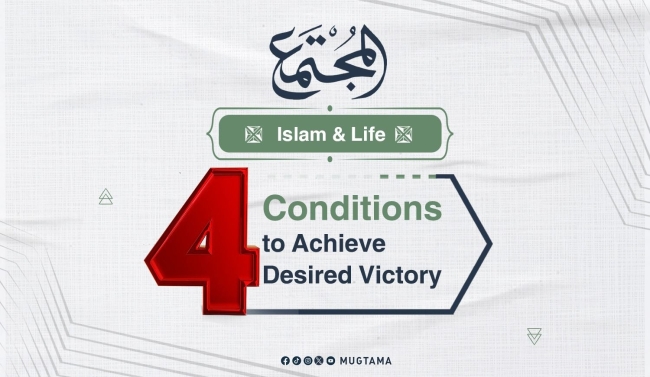Lately, it has become increasingly evident that we must prepare ourselves for the trials and challenges that lie ahead in order to deserve the victory Allah has promised us. This readiness applies to all segments of society—young and old, men and women, youth and elders alike. Achieving victory is a collective responsibility, not one that falls on a single group or faction.
When we examine the reasons that lead to victory, we find that the Quran provides us with much guidance, and the life of the Prophet ﷺ offers us many pathways to achieve empowerment. Yet, the essential question remains: what are the conditions for achieving victory? For it is known that victory requires an aware generation that embodies the qualities needed to fulfill this divine promise. Here are the most important requirements to achieve the desired victory:
- Certainty that Faith is the Core of the Battle:
Achieving the desired victory requires that its proponents understand the true nature, motivations, and ambitions of the enemy. This is only possible through an awareness of the enemy’s religious motives and a readiness to counter them, as Allah says, “And Allah is most knowing of your enemies; and sufficient is Allah as an ally, and sufficient is Allah as a helper.” (An-Nisa’: 45)
2. Understanding the Civilizational Nature of the Conflict:
This understanding necessitates the development of an Islamic project with its political, economic, and intellectual aspects, supported by scientific and technological advancements. We must acknowledge the scientific and technical progress that the adversary possesses and find ways to surpass and utilize it for the benefit of humanity, to save the world from a dark future. At the forefront of these efforts is drawing from the rich heritage of Islamic civilization throughout its history while keeping pace with modern advancements in a way that enables us to stand on equal footing with the adversary.
3. Recognizing the Ummah’s Mission:
The role of the best Ummah brought forth for mankind is profound, involving not only a specific group or elite leadership but also the support of the public and grassroots. It cannot be carried out solely by the youth without the wisdom of elders and experienced teachers, nor without the aspirations to pass on knowledge to younger, promising generations. This noble endeavor must embody the blessings of divine revelation, the Prophetic methodology, and the eternal natural and divine laws.
4. The Need for Strong, Insightful Workers:
The path to raising the Ummah requires both strength and the sharp-sightedness of those who are constantly mindful of the Hereafter, sincerely dedicating their efforts to Allah. Allah describes this in the Quran: “And remember Our servants, Abraham, Isaac, and Jacob - those of strength and [religious] vision. Indeed, We chose them for an exclusive quality: remembrance of the home [of the Hereafter].” (Sad: 45-46) This path is fraught with trials, as it involves opposing the schemes of tyranny and injustice, yet it is the only way to salvation—both in this world from the maliciousness of adversaries, which we have witnessed firsthand, and in the Hereafter from Allah’s judgment. Allah has entrusted us with His religion and the legacy of His Prophet, as He states, “And We had already destroyed generations before you when they wronged, and their messengers had come to them with clear proofs, but they were not to believe. Thus do We recompense the criminal people. Then We made you successors in the land after them so that We may observe how you will do.” (Yunus: 13-14)
-------------------------------------------------------------







